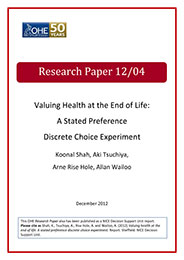Sign up to our newsletter Subscribe
Analysing Global Immunisation Expenditure

In 2009, the UK’s National Institute for Health and Clinical Excellence (NICE) issued supplementary advice that its Appraisal Committees are to consider when assessing treatments that extend life at the end of life. This includes an option for approving such treatments for use…
In 2009, the UK’s National Institute for Health and Clinical Excellence (NICE) issued supplementary advice that its Appraisal Committees are to consider when assessing treatments that extend life at the end of life. This includes an option for approving such treatments for use in the NHS if certain criteria are met, even if base case cost-effectiveness estimates exceed the range usually considered acceptable.
The policy thus places additional weight on the survival benefits for a small numbers of patients with terminal illnesses and short life expectancies. It assumes that this accurately reflects the preferences of the general public. However, little scientific evidence is available to support that premise.
With funding from NICE’s Decision Support Unit, Koonal Shah of the OHE has collaborated with Aki Tsuchiya, Arne Risa Hole and Allan Wailoo of the University of Sheffield to conduct research to help fill this void. A discrete choice experiment was conducted in March 2012 with a sample of 3,969 members of the general public in England and Wales. In reporting the results of the research, the authors state that: “Overall, the results of this study do not suggest that the cut-offs implied by the existing NICE supplementary end of life policy require amending, and in fact call into question whether such a policy of giving higher priority to end of life treatments than to other types of treatments is supported by the public at all, particularly if the health gains offered by the treatments being ‘de-prioritised’ are larger than those offered by the end of life treatments.”
A revised version of this paper has been published in Social Science & Medicine and can be downloaded from: http://www.sciencedirect.com/science/article/pii/S027795361400745X
Please cite as: Shah, K. K., Tsuchiya, A. and Wailoo, A. J., 2015. Valuing health at the end of life: A stated preference discrete choice experiment. Social Science & Medicine, 124, pp.48-56.
Valuing Health at the End of Life: A Stated Preference Discrete Choice Experiment
Shah, K., Tsuchiya, A., Risa Hole, A. and Wailoo, A.
(2012) Valuing Health at the End of Life: A Stated Preference Discrete Choice Experiment. OHE Grant-Funded Research. Available from https://www.ohe.org/publications/valuing-health-end-life-stated-preference-discrete-choice-experiment/
